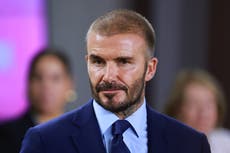As a fellow OCD sufferer, here’s my advice to David Beckham
Like Beckham, Ryan Coogan also grew up in an environment where mental health wasn’t a priority. He explains how the footballing legend can find his own path to taking control of his illness


Your support helps us to tell the story
From reproductive rights to climate change to Big Tech, The Independent is on the ground when the story is developing. Whether it's investigating the financials of Elon Musk's pro-Trump PAC or producing our latest documentary, 'The A Word', which shines a light on the American women fighting for reproductive rights, we know how important it is to parse out the facts from the messaging.
At such a critical moment in US history, we need reporters on the ground. Your donation allows us to keep sending journalists to speak to both sides of the story.
The Independent is trusted by Americans across the entire political spectrum. And unlike many other quality news outlets, we choose not to lock Americans out of our reporting and analysis with paywalls. We believe quality journalism should be available to everyone, paid for by those who can afford it.
Your support makes all the difference.If there’s one universal constant of which I’m aware, it’s that people who tell you they don’t believe in therapy really, really need therapy. It’s one of those accidental tells, like “I was hit as a kid and I turned out fine” or “I’m not racist, but…” that inadvertently reveals every single thing you need to know about a person wrapped up in a deliciously ironic package.
In a recent interview with The Telegraph, football superstar David Beckham described his own run-in with this phenomenon, and described how it shaped his life. The man with the golden balls described how, following a World Cup loss in 1998 that saw him labelled “the most hated man in the country”, he suffered a bout of depression. When asked if he received therapy during that period, Beckham replied that he did not.
“It’s something I would never admit, because I was brought up by a dad who, if I said, ‘Dad, I’m feeling a bit low today,’ he’d have said, ‘Boy, get on with it,’” he explained. He went on to say that, despite thinking therapy is a good idea in general, he’s never been to therapy in all the years since.
I have a lot of sympathy for Beckham, not least because I grew up on a council estate in Salford where the general view of going to therapy sat somewhere between not liking football and voluntarily reading poetry (I should know, I did all three). You didn’t get depressed; you “got sad sometimes”. If I told the men in my life that I thought I had anxiety they’d prescribe me 10ccs of “man up” and a way-too-hard dig in the arm.
We also share another unenviable trait. No, it’s not that we’re both talented athletes who are married to supermodels – I get out of breath when a movie is too exciting and my partner is finishing her PhD, so she looks like a cryptid at the moment – but we do both need therapy for the same specific reason. Like Beckham, I suffer from obsessive compulsive disorder, a condition that impacts every part of my life.
Beckham has described his own battle with OCD as “tiring”, and honestly that’s probably the best word for it. As with many mental health conditions the specifics can vary from person to person, but sufferers are usually compelled to engage in repetitive, obtrusive, and often bizarre or embarrassing behaviour. I’ve written about my own struggles before – about how half of the symptoms are impossible to describe despite the fact that they can eat up hours of my day, or how it’s had a huge impact on my personal and professional life – but it’s worth mentioning that for the first 25+ years of my life, I didn’t actually realise anything was wrong.
That wasn’t because I was okay – far from it – but because I didn’t have the language to express what specifically was wrong with me, and any time I tried to talk about it my concerns were handwaved away by the adults around me, who felt uncomfortable talking about mental health in general. It wasn’t until I finally spoke to a therapist that I was able to contextualise behaviours that I had engaged in since I was a little kid, and even just that knowledge alone suddenly made every tick and twitch a little easier to deal with.
I’m sure David won’t read this – if I was married to a Spice Girl I probably wouldn’t read the newspaper at all, let alone write for one – but on the off chance there are other people out there who don’t seek treatment for similar reasons, I will say this: whoever told you that treating your mental illness was a sign of weakness was misinformed, lying, avoiding therapy because they were scared of what they might find out about themselves, or a combination of all three. There are free options available on the NHS if you’re as skint as I was when I started seeking treatment, and really expensive options available if you happen to be a former Uefa club midfielder of the year: 1998–99.
Sometimes “getting on with it” isn’t really “getting on” with anything. You deserve an opportunity to at least try and take charge of your mental health.



Join our commenting forum
Join thought-provoking conversations, follow other Independent readers and see their replies
Comments